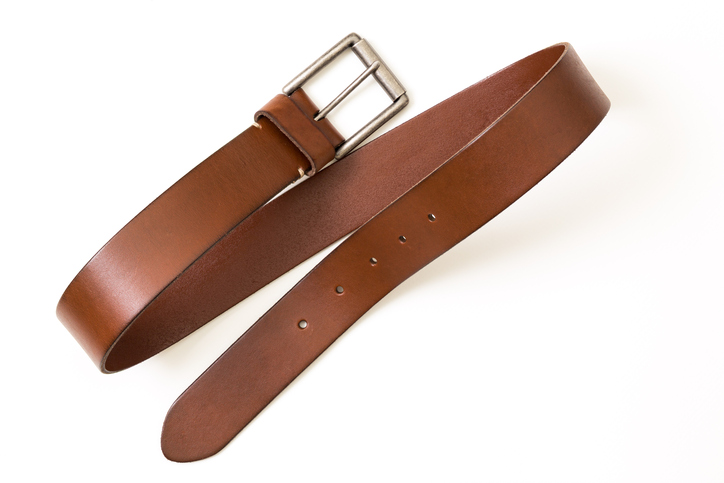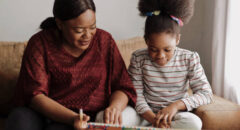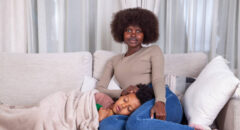
The Good Book says spare the rod, spoil the child. Whoopings, spankings or however you grew up defining discipline is often seen as a rites of passage in the Black community. Some people feel like a good 'ol whooping made them the responsible, mature adults they are now. But is spanking your child really the way to go in 2020 and beyond?
A study conducted by The University of Texas at Austin and the University of Michigan found that children who were spanked are more likely to exhibit anti-social behavior, experience mental health issues and show aggression. But if ask a lot of Black parents a whooping gets the point across like no other time-out or grounding can.
BlackDoctor.org asked Dr. Dennis C. Parker and Dr. E.O Henderson of 2 Docs and a Mic radio show what their years of research and experience show about disciplining your child.
Dr. Parker: The term “whooping” traditionally denotes certain cultural characteristics that assert putting someone on the correct path; whether it is a child that misbehaves at school, an employee that receives a written reprimand or a friend who may have overstepped their boundaries. The concept of spanking conversely has from a historical context been viewed as a means to correct children’s behaviors. While a number of studies are dated, the one I have referred to before is a 1994 study that indicated that violent elementary school boys that come from fatherless families or families where fathers do not demonstrate adequate affection to their boys and who utilize spanking as a form of corporal punishment, tend to become more violent.
The primary reason I utilize this resource study is that it identifies several other characteristics as I mentioned. Most notably for me the lack of a father in the household or the lack of fatherly affection, both identified variables pose a significant challenge to answering the question of whether spanking is wrong. To be clear, yes, child abuse is wrong, however spanking done under certain parameters may be the proper way to raise ones child.
However, without the father in the home or connected to the family unit, somehow demonstrating proper affection to the child and other family members, spanking ones child could have long-term punitive consequences, for boys in particular. This rather old study, yet still a relevant one, makes the inferences that long-term behavioral consequences could include violent behavior or even more aggressive behavior toward peers and/or siblings.
Some of us, including me, grew up getting a spanking with a switch and/or a paddle. Most, if not all, of my spankings included the perfunctory statement “this will hurt me more than it hurts you” conversations afterwards, which always led with a detailed explanation as to why I was being punished and what I should have done to avoid making that bad decision that I made.
As a child it was hard to delineate between the “carrot and the stick.” All I knew was that I would not do that again. As a man of 45 years of age, I can recall with clarity having many friends that fell into the category of not having a father at home or available to them and thus were more apt to the wrongs of the world. Some of those friends even found their way into the justice system, which utilizes all forms of punishment.
The father with the balanced approach to child governance stabilizes the family unit, whether living at home or living elsewhere. His presence is essential to child rearing and his absence is sorely missed in any conversation of corporal punishment.
As a father, I have attempted to identify other means to regulate behavior, including [taking away] electronic devices such as TV, iPod, iPad, Xboxes and any other mechanisms that these 21st-century children (like mine) hold dear to their heart. What I realized is, I am really looking to get their attention and utilize the uneasiness of not having ready access to their devices to regulate their behavior, which for the most part has been successful for me.
Is spanking your child wrong? It depends on your situation, your constant state of mind (non-angry), and most importantly your child’s emotional and psychological well-being. Fortunately or unfortunately depending on how you view it, the conversation is all relative to who you are as parents; what your belief system is, and how you effectively communicate with your children and loved ones. If you are able to perform the task in love with no anger or malice then it may work.
Short of that, you should possibly perform a quick Google search. I did a quick one for this interview and I found “25 Non-Violent Discipline Options for Children,” from the Suzuki Associations, but there are tons of others that will assist parents in addressing and redirecting behavior attributes.
Dr. Henderson: I’m in agreement with spanking on the hands or bottom. However, "whooping" children in 2016 is antiquated and the result of poor parenting. I won't go as far as to say it's wrong, but any parent that is still whooping their child has failed to teach and provide a healthy example of right or wrong for their child. Parents should be aware of best practice research that says "whooping" does teach aggression, and bullying of others and does not prevent the child from doing the same thing again.
The best way to spank your child is to use your hand or an object that will not leave marks. However, I think there are other options available and spanking should be used as a last resort. Often, parents are spanking as a first resort or out of anger which is unproductive.
The long term effects of spanking can result in a return of physical aggression towards others or the parent. In addition, spanking does not prevent the behavior from occurring and can cause emotional, mental and physical wounds down the road. It has been proven that children who have been spanked do hit other children in school or day care. In addition, the increase of bullying and intimidation among school age children I believe is a byproduct of spanking. The notion that children need to be spanked to be disciplined needs to be modified and reconsidered. Often we spank because we were spanked but few can provide evidence that spankings prevented us from disobeying. Typically, as humans we repeat the same mistakes we saw modeled and spankings fall into that category. Though I have spanked my children I regret it and admit it was not effective. The shame and guilt of parents is not worth it nor is the emotional pain created in the children. I believe spankings create an angry child and angry children become angry adults. The history of this country began violently and unfortunately, punishment and violence is being taught by those parents who have not been shown proper discipline measures.
There are several measures that can be used before reprimanding your child via spanking. Love is a weapon that should incorporated to redirect and establish a healthy relationship between the parent and child. The authority of a loving and patient parent is a great measure that can deter misbehavior. Coupled with firm guidelines, boundaries, and employing other forms of time outs, grounding, early bed times, taking away pleasure, or using chores can be successful. Spanking is easier and convenient but there is not evidence that suggests it works and produces law abiding adults.
Parenting classes are a great resource for how to parent children. In addition, for parents that don't know they can Google "better ways of parenting for our child." I would suggest reading as much as possible on discipline and the causes and effects. There is no one stop shop for parents that works for all. The services available can be found on the Internet, social services agencies, nonprofit agencies and some churches.
Thank you to Dr. Parker and Dr. Henderson for their sage advice. Hopefully our parent’s will take what you’ve said and reflect upon their own parenting practices.
2 Docs and a Mic is platform dedicated to pushing the conversation forward on issues in the Black church and as a source of empowerment for Black men. Catch Dr. Henderson and Dr. Parker’s radio show every Sunday at noon. Also, be on the lookout for their upcoming book “No Anger in Liberation” coming soon.








